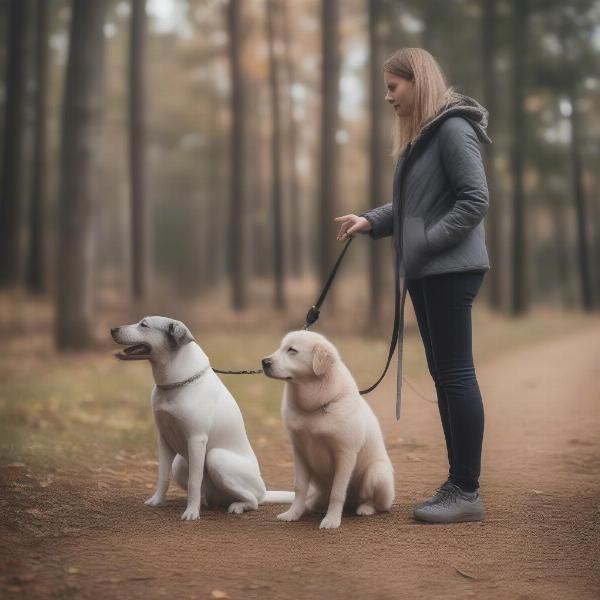Socializing an aggressive dog can be challenging, but with patience and the right approach, it can be done. This guide will provide you with practical steps and expert advice on how to safely and effectively socialize your aggressive dog, helping them become more comfortable and confident in various social situations. We’ll cover understanding the root of the aggression, implementing desensitization techniques, and creating positive experiences for your dog.
Understanding Your Dog’s Aggression
Before starting the socialization process, it’s crucial to understand why your dog is aggressive. Is it fear-based, territorial, possessive, or related to pain? Identifying the trigger is the first step to addressing the problem. Fear-based aggression is common and often manifests as barking, lunging, or even biting when your dog feels threatened. Territorial aggression might be directed towards strangers approaching your home or yard. A veterinarian can help you determine the cause of your dog’s aggression, ruling out any underlying medical conditions.
Creating a Safe and Controlled Environment
A crucial aspect of socializing an aggressive dog is creating a safe and controlled environment. This means starting with short, supervised interactions in a familiar place where your dog feels secure. Avoid overwhelming your dog with too many stimuli or unfamiliar dogs at once. Start with one calm, well-socialized dog at a distance and gradually decrease the distance as your dog becomes more comfortable.
Desensitization and Counter-Conditioning
Desensitization involves gradually exposing your dog to the triggers of their aggression at a low intensity, while counter-conditioning pairs the trigger with a positive experience, like a tasty treat. For example, if your dog reacts aggressively to the sight of other dogs, start by exposing them to a dog at a distance where they don’t react. Reward your dog with praise and treats for remaining calm. Gradually decrease the distance as your dog’s comfort level increases.
 Desensitization and Counter-Conditioning Techniques
Desensitization and Counter-Conditioning Techniques
Professional Guidance
Working with a certified professional dog trainer or behaviorist experienced in dealing with aggression is highly recommended. They can assess your dog’s individual needs and develop a tailored socialization plan. A professional can also guide you through the process, ensuring safety and effectiveness. They can offer specific techniques and strategies to address your dog’s unique challenges.
Positive Reinforcement and Patience
Positive reinforcement is key to successful socialization. Reward your dog for calm and appropriate behavior with praise, treats, or toys. Never punish your dog for aggressive behavior, as this can exacerbate the problem. Socializing an aggressive dog takes time and patience. Don’t expect overnight results. Consistency and positive experiences are essential for making progress.
Recognizing Body Language
Learning to read your dog’s body language is essential. Look for signs of stress or discomfort, such as yawning, lip licking, whale eye (showing the whites of their eyes), tucked tail, or flattened ears. If you notice these signs, remove your dog from the situation immediately.
Conclusion
Socializing an aggressive dog is a journey that requires dedication and understanding. By addressing the underlying causes of aggression, creating a safe environment, and using positive reinforcement techniques, you can help your dog overcome their challenges and become a more confident and well-adjusted member of society. Remember, patience is key, and professional guidance is highly recommended for the best results. Working with a qualified trainer can significantly increase your chances of success in how to socialize an aggressive dog.
FAQ
- How long does it take to socialize an aggressive dog? The time it takes to socialize an aggressive dog varies depending on the severity of the aggression, the dog’s individual temperament, and the consistency of training. It can take weeks, months, or even longer.
- Can I socialize an aggressive dog on my own? While it’s possible to work on socialization yourself, seeking professional guidance is highly recommended, especially with aggressive dogs. A professional can provide tailored advice and ensure safety.
- What if my dog bites someone during socialization? If your dog bites someone, seek immediate veterinary attention for the person bitten and consult with a veterinary behaviorist or certified professional trainer experienced in aggression cases.
- Is it too late to socialize an older dog with aggression issues? It’s never too late to start working on socialization, even with older dogs. However, older dogs may require more patience and a more gradual approach.
- Are there any breeds that are inherently more aggressive? While certain breeds may have a predisposition towards certain behaviors, any dog can develop aggression regardless of breed. Proper socialization and training are crucial for all dogs.
- Can I take my aggressive dog to a dog park? Dog parks are generally not recommended for aggressive dogs, especially during the initial stages of socialization. Controlled, supervised interactions in a quiet environment are much safer and more effective.
- What are some common triggers of aggression in dogs? Common triggers include fear, territoriality, possessiveness, pain, frustration, and past trauma.
Related Articles
ILM Dog is your trusted resource for expert dog care advice. We offer comprehensive guidance on all aspects of dog ownership, from breed selection and health care to training, nutrition, and grooming. Our team of experts provides practical, science-backed information to help you give your furry friend the best possible care. Whether you’re a seasoned dog owner or just starting out, ILM Dog is here to support you every step of the way. For personalized advice or to learn more about our services, contact us via email at [email protected] or call us at +44 20-3965-8624. For more helpful tips and resources, visit ILM Dog.